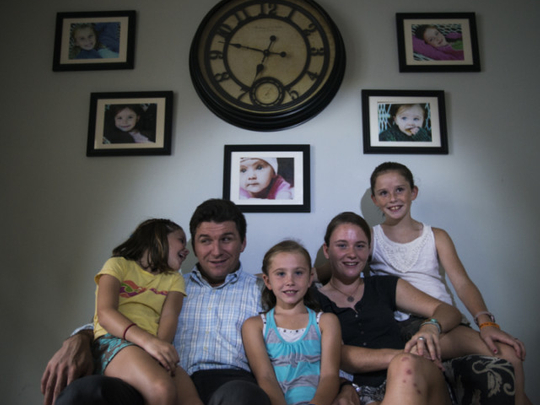
Tie-dyed sheets line the back of a classroom in Chevy Chase, Maryland where a group of preteen girls sit discussing some of the weightier topics of adolescent life: Why do we feel the need to conform? Is it harder to stick up for ourselves or for someone else? What does it really mean to be beautiful?
“I said that it means if you have a good personality,” volunteers Maeve Murray, a freckle-faced 11-year-old with auburn hair. “It’s not about what you look like or how you dress.”
The event, called GirlsUp, is Maeve’s mother’s doing. Kelly Murray got a doctorate in psychology, joined the navy, became a professor and then had six daughters. Six. By the time the oldest was in junior high, Kelly had become very interested in the way society tells girls who they should be. How to look and act. And how these expectations sap their confidence just when they need it most.
Kelly wanted to get there first — to help girls figure out who they are before the world does it for them. So six summers ago, she set up camp, gathering her two oldest daughters and a half-dozen of their friends to talk about such things as self-image and self-reliance.
But Kelly didn’t know then what the programme would mean to her daughters today, when it would carry a message that she could no longer deliver herself.
Homework assignment: To whom do you compare yourself, and why?
“I compare myself to my dad,” Maeve says. “Because he, like, works really hard at his job — and he takes care of all us girls alone.”
On the evening of June 26, 2009, Kelly, 40, and the five youngest girls — Meghan, 11; Sloane, 7; Maeve, 6; Quinn, 2; and Kieran, 9 months — had been at the Chevy Chase Recreation Association for a swim team potluck. When the rain started, the girls and two of Meghan’s friends piled into Kelly’s minivan. She was driving down Connecticut Avenue, less than a half-mile from their house, when a massive oak branch crashed down on to the van.
Sean Murray arrived at the hospital just as his family emerged from a train of ambulances. He began counting heads.
“You’re just like, ‘Whoa - what’s the deal? Where’s Sloane? Where’s Mom?’” he recalls. Then a social worker escorted him to a private room and told him that his wife of 13 years and their effervescent 7-year-old were dead.
In that moment one thought enveloped him — This existence is over — and was immediately swallowed by another: This existence is more precious than ever before. Because there were five other children out there, “and I’m now the be-all and end-all of their life.”
For a while, life was all questions and confusion. “How am I going to get through my teenage years?” Meghan remembers thinking. “How am I going to get through life without a mum?”
As a lawyer and a military man, Sean was used to going “to the book”. But there was no guide for this, for how a father should raise five daughters by himself. Yet there was a certain way in which he felt prepared. “Kelly was such a fantastic mum, and I literally felt like, ‘I’ve been trained for this,’” he says.
So he did what they’d always done. He kept the girls on their soccer teams. He insisted that they eat two vegetables every night at dinner. He cut their hair short in the summer and let it grow long in the winter. He expected them to pick up after themselves, to always try their best and to live up to their potential.
The second session of GirlsUp was scheduled to take place two weeks after the accident. Debra Soltis, one of Murray’s best friends, had spent so many hours talking with Kelly about the programme that she knew it had to continue.
She studied Kelly’s notes, developed a curriculum and taught the programme to that year’s participants — including Jillian and Meghan. “Their presence in the room made the entire experience poignant and particularly inspiring,” she says.
The programme now hosts 80 to 100 girls a year.
Today’s theme is self-expression, so the campers will talk about how to make their voices heard. They’ll meditate, improvise ways to navigate tough social situations and take pictures of themselves.
And through it all, Soltis says, Kelly will be there. “It’s great that her own daughters get to continue to hear the wisdom and the guidance from her,” she says. “And it’s wonderful that many others girls get to hear it as well.”
At the end of each session, the campers decorate mirrors with words and expressions that describe their true essence. Maeve, who wears a rubber band bearing the names “Kelly” and “Sloane” around her ankle, spells out “happy”, “confident”, “friendly” and “stronger”.
— Washington Post











